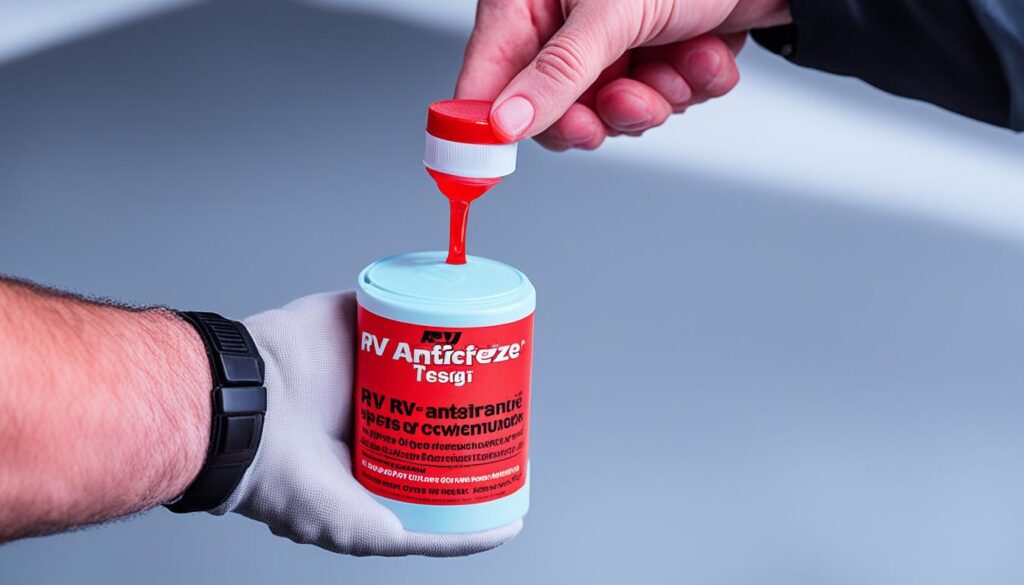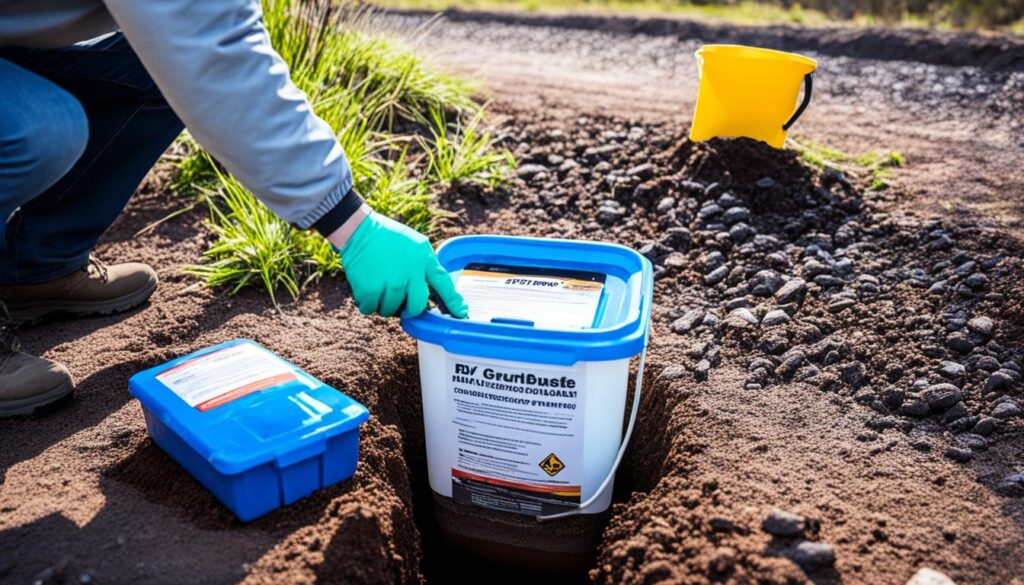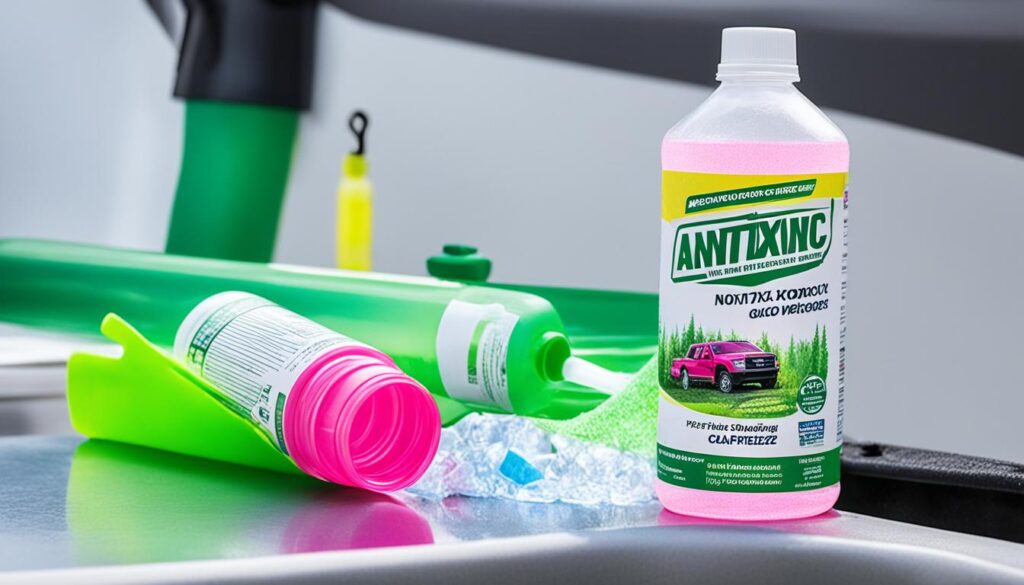RV antifreeze is a vital component in protecting the plumbing system of RVs during freezing temperatures. But have you ever wondered if RV antifreeze is actually toxic? Is it safe to use in your freshwater tank? And what are the potential health risks associated with it?
Key Takeaways
- There are two common types of RV antifreeze: ethanol-based and propylene glycol-based.
- Ethanol-based antifreeze is toxic to humans and can leave an unpleasant taste in the water lines.
- Propylene glycol-based antifreeze is non-toxic to humans and is safe to use in the freshwater tank.
- RV antifreeze should not be dumped on the ground as it can harm the environment.
- Proper disposal methods involve pouring antifreeze into a drain that leads to a wastewater treatment facility or using a regular RV dump station.
Now, let’s explore the topic in more detail and find out the answers to these intriguing questions.
Contents
Is RV Antifreeze Toxic to Humans?
When it comes to the safety of RV antifreeze, one of the most important questions to consider is whether it is toxic to humans. After all, the health and well-being of ourselves and our loved ones should always be a top priority. Fortunately, when used as directed, RV antifreeze is specifically formulated to be non-toxic to humans.
Unlike automotive antifreeze, which contains ethylene glycol and can be harmful if ingested, RV antifreeze is typically made from propylene glycol, a safer alternative. This means that in the event of accidental contact or consumption, RV antifreeze poses minimal risk to human health.
“RV antifreeze is specifically formulated to be non-toxic to humans.”
It’s important to note, however, that RV antifreeze is not intended for drinking purposes and should not be ingested. While propylene glycol-based antifreeze is generally considered safe, it is always recommended to avoid unnecessary exposure and to handle it with care.
The primary purpose of RV antifreeze is to protect the RV’s fresh water systems and plumbing lines during winterization or colder months. By lowering the freezing temperature of the water, it provides crucial protection against damage.
“RV antifreeze is not intended for drinking purposes and should not be ingested.”
It’s important to always adhere to the manufacturer’s instructions for proper handling and disposal of RV antifreeze. Following these guidelines helps ensure the safety of both humans and the RV’s water system.
| Is RV Antifreeze Toxic to Humans? | Safety of RV Antifreeze | Is RV Antifreeze Harmful to Health? |
|---|---|---|
| No, when used as directed | Non-toxic | Minimal risk to human health |

Using RV Antifreeze Responsibly
While RV antifreeze is considered safe when used properly, it is essential to take the necessary precautions to ensure the well-being of yourself and those around you. Here are a few key tips for using RV antifreeze responsibly:
- Read and follow the manufacturer’s instructions carefully.
- Wear gloves and other protective clothing when handling RV antifreeze.
- Avoid contact with eyes and skin. In case of contact, rinse thoroughly with water.
- Store RV antifreeze in a cool, dry place, out of reach of children and pets.
- Dispose of used antifreeze according to local regulations and guidelines.
By following these guidelines and using RV antifreeze responsibly, you can ensure the safety of yourself, your family, and your RV’s water system.
Is RV Antifreeze Toxic to Animals?
Is it Safe to Put RV Antifreeze in My Freshwater Tank?
When it comes to protecting your RV’s water system from freezing temperatures, using RV antifreeze in your freshwater tank can be a safe and effective solution. However, it’s important to ensure that you are using the right type of antifreeze and following the appropriate guidelines to maintain the safety of your water system and plumbing lines.
Using RV antifreeze in your freshwater tank can provide the following benefits:
- Protection against freezing temperatures: RV antifreeze helps lower the freezing temperature of the water in your freshwater tank, preventing any potential damage or leaks that can occur when water freezes.
- Compatibility with the water system: RV antifreeze is specifically designed to be compatible with the materials used in RV water systems and plumbing lines. This ensures that it will not cause any damage or deterioration to the system.
- Ease of use: Adding RV antifreeze to your freshwater tank is a simple process that can be done by following the manufacturer’s instructions. It is a convenient solution to protect your RV’s water system during winterization or colder months.
However, it’s crucial to properly de-winterize your RV’s water system in the spring to ensure that the water is safe for consumption. Flushing out the antifreeze from the system and thoroughly rinsing it will remove any traces of the antifreeze, allowing you to use the water system without any concerns.
It’s essential to keep in mind the following tips for using RV antifreeze in your freshwater tank:
- Use only propylene glycol-based antifreeze: Propylene glycol-based antifreeze is non-toxic to humans and is the recommended type of antifreeze for RV water systems. It is safer to use compared to ethanol-based antifreeze, which can leave an unpleasant taste in the water lines.
- Follow the manufacturer’s instructions: Always read and follow the instructions provided by the manufacturer of the RV antifreeze. This will ensure that you are using the product correctly and minimizing any potential risks.
- Dispose of antifreeze properly: When disposing of RV antifreeze, it’s important to follow proper disposal methods to prevent harm to the environment. Pouring it into a drain that leads to a wastewater treatment facility or using a regular RV dump station are recommended disposal methods.
By using propylene glycol-based RV antifreeze in your freshwater tank and following the manufacturer’s instructions, you can safely protect your RV’s water system from freezing temperatures and ensure the longevity of your plumbing lines.
Is RV Antifreeze Safe to Dump on the Ground?
RV antifreeze should not be dumped on the ground as it can be harmful to the environment. It can seep into groundwater supplies, raising toxicity levels in local water sources. Additionally, it can harm plants, insects, and small mammals if consumed.
Proper disposal of RV antifreeze involves pouring it into a drain that leads to a wastewater treatment facility or using a regular RV dump station. It’s important to follow proper disposal methods to prevent negative impacts on the environment.

Safe RV Antifreeze Disposal Methods
- Pour RV antifreeze into a drain that leads to a wastewater treatment facility.
- Use a regular RV dump station to dispose of the antifreeze.
- Ensure that the antifreeze is properly sealed in a container before disposing of it.
- Do not pour RV antifreeze into household drains or on the ground.
- If your local area has specific guidelines for disposing of antifreeze, follow them accordingly.
By following these proper disposal methods, you can do your part in protecting the environment and preventing harm to wildlife and ecosystems.
| Proper RV Antifreeze Disposal | Improper RV Antifreeze Disposal |
|---|---|
|
|
What is the Best Type of RV Antifreeze?
When it comes to choosing the best type of RV antifreeze, propylene glycol-based antifreeze stands out as the top choice. Not only is it non-toxic to humans, but it also offers excellent protection against freezing temperatures, ensuring the safety and longevity of your RV’s plumbing system.
One of the key advantages of propylene glycol RV antifreeze is its non-flammable nature, making it safe and easy to store. You can have peace of mind knowing that you’re using a product that prioritizes safety without compromising on effectiveness.
In addition, propylene glycol antifreeze does not leave a strong aftertaste in the water system. This means you can have clean and fresh-tasting water when using your RV’s plumbing system, minimizing any unpleasant experiences during your travels.
Furthermore, propylene glycol-based antifreeze helps preserve the sealing properties of gaskets, ensuring a tight and leak-free water system. By choosing this type of RV antifreeze, you’re investing in a product that not only protects your RV but also enhances its performance and efficiency.
FAQ
What is in RV Antifreeze: Understanding if RV Antifreeze is Toxic
RV antifreeze is typically made from propylene glycol, a safer alternative to the toxic ethylene glycol found in automotive antifreeze. It is important to understand the potential risks and safety precautions associated with using RV antifreeze.
Is RV Antifreeze Toxic to Humans?
When used as directed, RV antifreeze is specifically formulated to be non-toxic to humans. Unlike automotive antifreeze, which contains ethylene glycol and can be harmful if ingested, RV antifreeze is typically made from propylene glycol, a safer alternative. However, it’s important to note that RV antifreeze is not intended for drinking purposes and should not be ingested.
Is RV Antifreeze Toxic to Animals?
While propylene glycol is non-toxic to humans, it can be toxic to animals, particularly to cats and dogs. Even in small quantities, antifreeze has the potential to harm or even kill pets. It’s crucial to handle and dispose of RV antifreeze carefully to prevent harm to animals.
Is it Safe to Put RV Antifreeze in My Freshwater Tank?
It is safe to put RV antifreeze in the freshwater tank as long as it is propylene glycol-based and used as directed. RV antifreeze is specifically designed to be compatible with the RV’s water system and plumbing lines. However, it’s important to thoroughly flush out the antifreeze from the system when de-winterizing in the spring to ensure the water is safe for consumption.
Is RV Antifreeze Safe to Dump on the Ground?
RV antifreeze should not be dumped on the ground as it can be harmful to the environment. It can seep into groundwater supplies, raising toxicity levels in local water sources. Proper disposal of RV antifreeze involves pouring it into a drain that leads to a wastewater treatment facility or using a regular RV dump station.
What is the Best Type of RV Antifreeze?
The best type of RV antifreeze is propylene glycol-based antifreeze. It is considered the safest option for RVs as it is non-toxic to humans and provides effective protection against freezing temperatures. Propylene glycol antifreeze is also non-flammable and helps preserve the sealing properties of gaskets.






